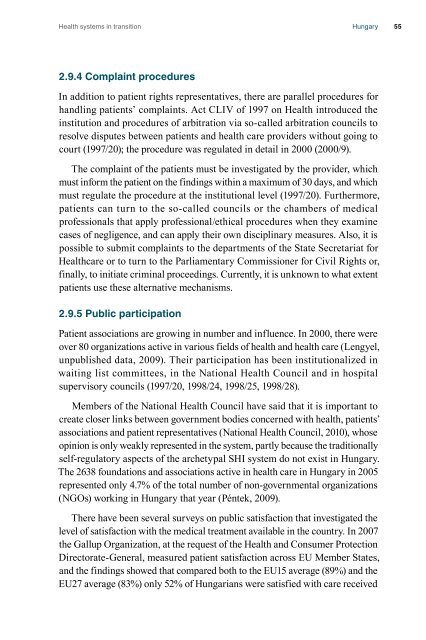Health Systems in Transition - Hungary - World Health Organization ...
Health Systems in Transition - Hungary - World Health Organization ...
Health Systems in Transition - Hungary - World Health Organization ...
You also want an ePaper? Increase the reach of your titles
YUMPU automatically turns print PDFs into web optimized ePapers that Google loves.
<strong>Health</strong> systems <strong>in</strong> transition <strong>Hungary</strong> 55<br />
2.9.4 Compla<strong>in</strong>t procedures<br />
In addition to patient rights representatives, there are parallel procedures for<br />
handl<strong>in</strong>g patients’ compla<strong>in</strong>ts. Act CLIV of 1997 on <strong>Health</strong> <strong>in</strong>troduced the<br />
<strong>in</strong>stitution and procedures of arbitration via so-called arbitration councils to<br />
resolve disputes between patients and health care providers without go<strong>in</strong>g to<br />
court (1997/20); the procedure was regulated <strong>in</strong> detail <strong>in</strong> 2000 (2000/9).<br />
The compla<strong>in</strong>t of the patients must be <strong>in</strong>vestigated by the provider, which<br />
must <strong>in</strong>form the patient on the f<strong>in</strong>d<strong>in</strong>gs with<strong>in</strong> a maximum of 30 days, and which<br />
must regulate the procedure at the <strong>in</strong>stitutional level (1997/20). Furthermore,<br />
patients can turn to the so-called councils or the chambers of medical<br />
professionals that apply professional/ethical procedures when they exam<strong>in</strong>e<br />
cases of negligence, and can apply their own discipl<strong>in</strong>ary measures. Also, it is<br />
possible to submit compla<strong>in</strong>ts to the departments of the State Secretariat for<br />
<strong>Health</strong>care or to turn to the Parliamentary Commissioner for Civil Rights or,<br />
f<strong>in</strong>ally, to <strong>in</strong>itiate crim<strong>in</strong>al proceed<strong>in</strong>gs. Currently, it is unknown to what extent<br />
patients use these alternative mechanisms.<br />
2.9.5 Public participation<br />
Patient associations are grow<strong>in</strong>g <strong>in</strong> number and <strong>in</strong>fluence. In 2000, there were<br />
over 80 organizations active <strong>in</strong> various fields of health and health care (Lengyel,<br />
unpublished data, 2009). Their participation has been <strong>in</strong>stitutionalized <strong>in</strong><br />
wait<strong>in</strong>g list committees, <strong>in</strong> the National <strong>Health</strong> Council and <strong>in</strong> hospital<br />
supervisory councils (1997/20, 1998/24, 1998/25, 1998/28).<br />
Members of the National <strong>Health</strong> Council have said that it is important to<br />
create closer l<strong>in</strong>ks between government bodies concerned with health, patients’<br />
associations and patient representatives (National <strong>Health</strong> Council, 2010), whose<br />
op<strong>in</strong>ion is only weakly represented <strong>in</strong> the system, partly because the traditionally<br />
self-regulatory aspects of the archetypal SHI system do not exist <strong>in</strong> <strong>Hungary</strong>.<br />
The 2638 foundations and associations active <strong>in</strong> health care <strong>in</strong> <strong>Hungary</strong> <strong>in</strong> 2005<br />
represented only 4.7% of the total number of non-governmental organizations<br />
(NGOs) work<strong>in</strong>g <strong>in</strong> <strong>Hungary</strong> that year (Péntek, 2009).<br />
There have been several surveys on public satisfaction that <strong>in</strong>vestigated the<br />
level of satisfaction with the medical treatment available <strong>in</strong> the country. In 2007<br />
the Gallup <strong>Organization</strong>, at the request of the <strong>Health</strong> and Consumer Protection<br />
Directorate-General, measured patient satisfaction across EU Member States,<br />
and the f<strong>in</strong>d<strong>in</strong>gs showed that compared both to the EU15 average (89%) and the<br />
EU27 average (83%) only 52% of Hungarians were satisfied with care received
















